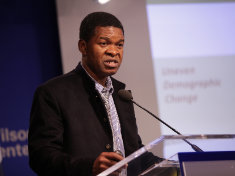-
Parfait Eloundou-Enyegue: Generational Inequality in the Sahel a Security Risk
May 29, 2015 By Linnea Bennett
Rapid population growth, which many Sahelian countries are experiencing, is often associated with an increased risk of sociopolitical violence. But in this week’s podcast, Cornell University Professor Parfait Eloundou-Enyegue argues there is another factor related to demographic change that governments and development organizations should account for: inequality.
Rapid population growth, which many Sahelian countries are experiencing, is often associated with an increased risk of sociopolitical violence. But in this week’s podcast, Cornell University Professor Parfait Eloundou-Enyegue argues there is another factor related to demographic change that governments and development organizations should account for: inequality.
It’s not so much overall inequality rates that are important in this context, he says, but comparisons between peers. The richest among African youth often live very different lives than the rest of their generational compatriots. Things like how likely parents are to invest in their children, how much they have to invest, and family size vary greatly, creating different opportunities which can have life-long repercussions. “Class differences and demographic behavior translate into inequality among children, and these inequalities work their way up through adulthood,” Eloundou-Enyegue says.
“These inequalities work their way up through adulthood”“If you look at sub-Saharan Africa in particular, including the Sahel region, you find many countries in Africa have higher levels of inequality than the U.S. at a time when the U.S. was at its own historical high,” says Eloundou-Enyegue. “That’s quite impressive.” What’s more, there seems to be a connection between inequality and demographic change. When comparing countries within the Sahel, he points out that inequality, measured in a variety of ways, is higher among countries where women on average have less than six children apiece than those where they have more.
This suggests countries are experiencing an “uneven demographic dividend,” as he calls it, which may lead to violence as inequality follows young people from childhood to adolescence, especially when young people seek work for the first time. “It’s especially at the nexus of this transition from school to work that it can actually trigger violence,” Eloundou-Enyegue says. “Young adults are going to remain unemployed after they leave school and that is one of the contributors, in my estimation, to violence.” Recruitment for Boko Haram in Nigeria, which has some of the highest levels of inequality in the region, has been linked to unemployment and disillusionment among young men, for example.
To fight inequality among youth, Eloundou-Enyegue proposes an emphasis on job training and employment opportunities to help level the playing field. But he adds it won’t be as simple as “just getting a job,” as civic engagement and behavior change are also important to change things like family size and propensity to invest in children that lead to such inequalities in the first place.
Parfait Eloundou-Enyegue spoke at the Wilson Center on May 12. Download his slides for more.
Friday Podcasts are also available for download on iTunes.
Sources: U.S. Institute of Peace.
Topics: Africa, aging, conflict, demography, development, economics, featured, Friday Podcasts, livelihoods, Nigeria, population, poverty, Sahel, security, U.S., youth
 A Publication of the Stimson Center.
A Publication of the Stimson Center.




